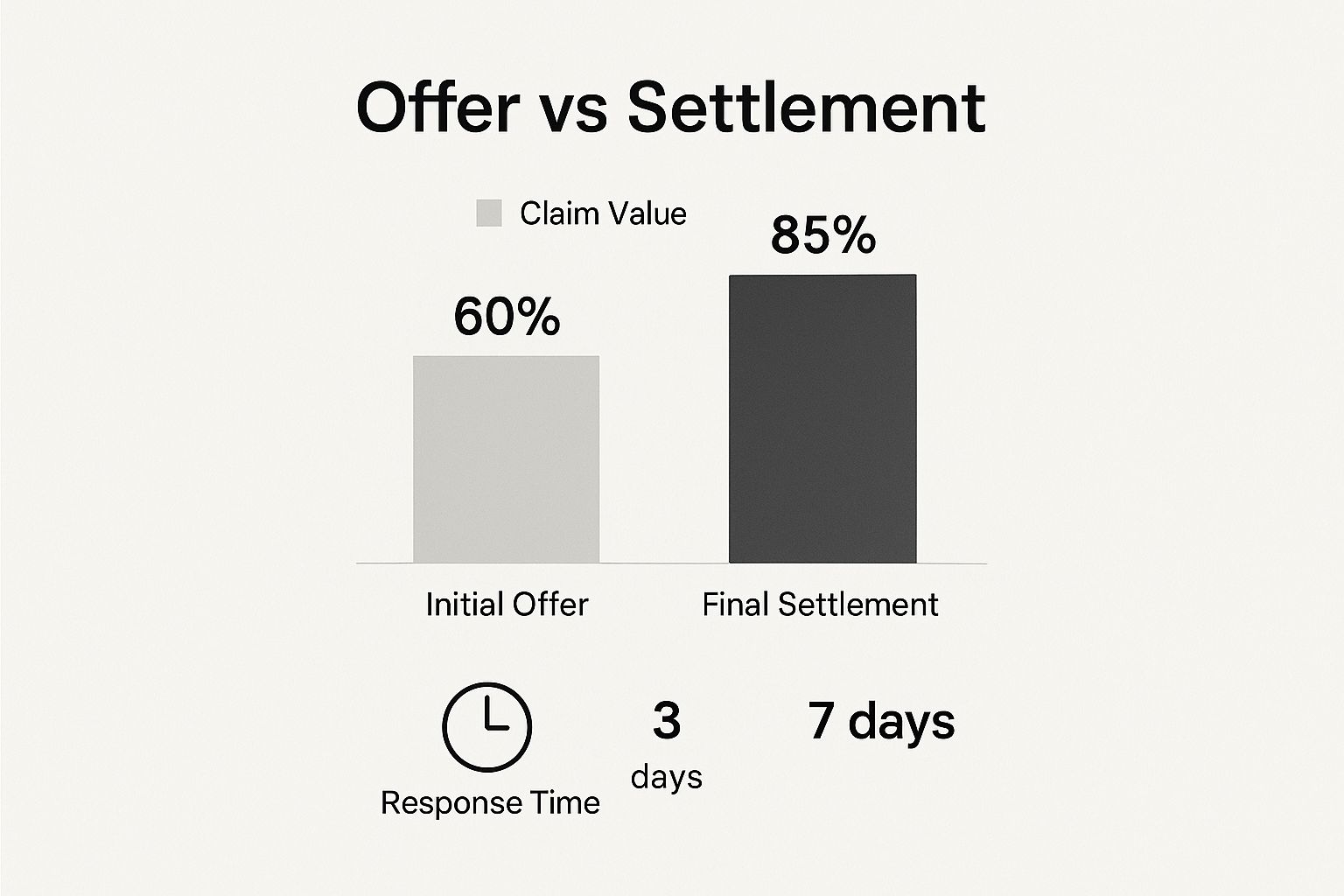How to Deal with Insurance Adjusters: Expert Tips to Win Your Claim
"I was satisfied once John Bell took over my case."
"Communication was always timely."
How to Deal with Insurance Adjusters: Expert Tips to Win Your Claim
Dealing with an insurance adjuster isn't a casual chat—it's a business transaction. To come out on top, you need to be calm, organized, and strategic from the moment you pick up the phone. The secret is to share only the absolute necessary facts, never admit any degree of fault, and carefully control the information you provide.
If you can master that first interaction, you set a powerful and positive tone for the entire rest of your claim.
Your First Conversation With The Insurance Adjuster
That first phone call from the insurance adjuster is a pivotal moment. It's not just a friendly check-in; it's the opening move in a negotiation where their primary goal is to protect their company's bottom line. That often means finding any reason they can to pay you as little as possible.
You absolutely must go into this conversation prepared, confident, and with a clear understanding of what to say and, more importantly, what not to say.
What To Say And What To Avoid
Before you even think about answering their call, take a few deep breaths and gather your essential documents. Having the police report number, your own notes from the accident, and the other driver's information at your fingertips instantly shows the adjuster you're organized and serious.
When you do speak with them, always be polite but firm. Stick to the bare-bones facts of the incident—the date, the time, and the location. That's it. You don't need to launch into a detailed story or guess about what might have happened.
Keep your answers simple and non-committal. A classic adjuster question is, "How are you feeling today?" Instead of saying "I'm fine," which can be twisted later to mean your injuries weren't severe, a much safer response is, "I'm currently under a doctor's care."
Crucial Takeaway: You have no legal obligation to provide a recorded statement, especially during the first call. You can—and should—politely decline. A simple, "I'm not comfortable giving a recorded statement at this time," is all you need to say. This single sentence is your best defense against having your own words used against you later.
It helps to remember who you're dealing with. Claims adjusting is a massive, highly specialized industry. Globally, it's a $14.6 billion market that has seen a 9.6% annual growth rate recently. This isn't some small-time operation; adjusters are highly trained professionals working within a huge, structured system designed for one thing: closing claims efficiently and for the lowest possible cost. You can read more about the claims adjusting market trends to get a better sense of their world.
Setting The Right Tone From The Start
Your objective in this first conversation is to establish control and set firm boundaries. You're letting the adjuster know that you're going to be thorough and you expect them to be as well.
Here’s a quick rundown of how to handle that first call:
- Stick to the basics. Just provide your name, address, and confirm the date and location of the incident.
- Keep it short. Don't volunteer extra details, and definitely don't get emotional. The less you say, the better.
- Take meticulous notes. Get the adjuster's full name, title, direct phone number, and the claim number. Log the date and time of the call and jot down a quick summary of everything you discussed.
To make this even easier, here’s a quick checklist to help you manage that first contact.
Your Initial Interaction Checklist
This table breaks down the essential steps to take before, during, and after your first conversation with the adjuster. Think of it as your game plan for that crucial first contact.
| Gather Your Documents | Shows you are prepared and serious. Prevents you from fumbling for information. | Have the police report number, photos, and other driver's info on hand. |
| Decline a Recorded Statement | Protects you from saying something that could be misinterpreted or used against you later. | "I'm not prepared to give a recorded statement right now." |
| Avoid Discussing Injuries | Prevents the adjuster from downplaying the severity of your injuries. | Instead of "My neck hurts a little," say "I am seeking medical treatment." |
| Don't Admit Any Fault | Admitting even a small amount of fault can significantly reduce or eliminate your settlement. | Avoid phrases like "I should have seen them" or "I was in a hurry." |
| Take Detailed Notes | Creates a record of your conversation and holds the adjuster accountable. | Note the adjuster's name, claim number, and a summary of what was said. |
By following this checklist, you're not just answering a phone call; you're taking the first and most important step in protecting your rights and ensuring you are treated fairly throughout the claims process.
By managing this first contact like a pro, you send a clear message: you're an informed and serious claimant. This simple act positions you for a much stronger negotiation as your claim moves forward.
Taking Control of the Conversation

From the moment you file a claim, every single interaction you have with an insurance adjuster is part of the official record. It's your job to make sure that record is accurate, factual, and supports your case.
Unplanned phone calls are where most people get into trouble. A simple, off-the-cuff comment can easily be misinterpreted or twisted to downplay your injuries or cast doubt on the accident details. The best way to prevent this is to take control of how, when, and where you communicate.
The smartest strategy? Move the conversation from spoken words to written ones.
Always Put It in Writing
Make a habit of insisting on email for any important discussions. This isn't you being difficult; it's you being thorough. An email chain creates a perfect, time-stamped log of every question asked, every answer given, and every document sent. There’s no room for "he said, she said."
Since email is now your main communication channel, it pays to get organized. Following good email management best practices will help you keep everything clear and under control, so you can pull up any piece of correspondence in seconds.
What if the adjuster calls you out of the blue? Keep it short and sweet. If it's a simple question you can answer easily, do so. But immediately pivot the conversation back to email.
A simple, polite script works wonders here: "Thanks for calling. So we both have an accurate record, could you send me that request in an email? I want to be sure I get you exactly what you need."
This approach is professional and firm. It sets a clear boundary and shows you’re committed to precise documentation. More importantly, it gives you the time to think through your response carefully instead of being pressured on the spot.
Documenting Every Phone Call
Look, sometimes a phone call is just going to happen. When it does, your role is to be the best note-taker in the room. Don’t ever trust your memory after a stressful conversation.
The second you hang up the phone, write down these details:
- The date and exact time of the call.
- The full name and title of the adjuster or representative.
- A quick summary of the main points discussed.
- Any promises made or next steps that were agreed upon.
For instance, your notes might look something like this:
- Jan 22, 2025, 2:15 PM - Spoke with Jane Doe, Senior Claims Adjuster.
- Requested copies of my latest physical therapy bills.
- Agreed to email them by the end of the day tomorrow (Jan 23).
- She confirmed they received my last email from Jan 20.
This simple habit turns a casual chat into a concrete piece of evidence for your file. By staying calm, sticking to the facts, and steering the flow of communication, you build a narrative that works for you, not against you.
Building an Unshakeable Record of Your Claim

When you're up against an insurance adjuster, a well-supported claim is your single most powerful tool. Think of it this way: your story is only as strong as the proof you have to back it up. We need to go beyond just stuffing receipts in a folder and start building a comprehensive file that leaves absolutely no room for doubt.
This means documenting every single expense related to your accident, no matter how small it seems. I tell my clients to think of it like keeping a detailed financial diary of their recovery. This log should capture everything from prescriptions and co-pays to the cost of over-the-counter supplies like bandages or a knee brace.
Documenting Your Economic Damages
Economic damages are the tangible, out-of-pocket financial losses you've suffered. In theory, these are the easiest to prove, but that’s only true if you track them obsessively. You can bet the adjuster will pick apart every cost you claim, so your record has to be bulletproof.
Get a spreadsheet going or grab a dedicated notebook right away. Your mission is to create an undeniable tally of what this injury has cost you.
- Medical Bills & Co-pays: Hold onto every single invoice, statement, and receipt. This includes doctors, hospitals, physical therapists, chiropractors—everyone.
- Prescription Costs: Save the pharmacy receipt for every medication you fill related to your injuries.
- Travel Expenses: Keep a simple log of the mileage for every trip to a doctor's appointment, therapy session, or pharmacy run. A quick note with the date, destination, and round-trip miles is all you need.
Pro Tip: I always advise clients to snap a photo of every receipt with their phone the second they get it. This creates an instant digital backup in case the original gets lost or the ink fades. A crystal-clear paper trail is your best defense when an adjuster tries to downplay your expenses.
To keep everything organized, looking into electronic document management systems can be a game-changer. These tools help you store all your documents in one secure, easily searchable place. For a deeper dive into what to collect, our guide on https://www.belllawoffices.com/auto-accident-lawyer/what-evidence-do-i-need-to-gather-for-my-auto-accident-case/ is an excellent resource.
Quantifying Your Pain and Suffering
This is where so many people leave money on the table. "Pain and suffering" might sound abstract, but you can—and must—make it concrete. Adjusters love to minimize these non-economic damages because they aren't tied to a neat and tidy bill. Your job is to paint a vivid picture of how your injuries have truly impacted your life.
Your most effective weapon here is a daily journal. This isn't just a diary for your feelings; it's a critical log of how the injury disrupts your day-to-day existence.
What to Track in Your Daily Journal:
Pain Levels: Use a simple 1-10 scale. How bad was the pain today? More importantly, what did it feel like? Was it a sharp, stabbing pain or a dull, constant throb?
Limitations: What couldn't you do today that you normally would? Be specific. "Couldn't lift my toddler," "Had to ask my spouse to open a jar," or "Missed my weekly walk with a friend."
Emotional State: Document the frustration, anxiety, or depression that comes with being injured and unable to live your life normally.
Sleep Disruption: Did pain keep you up last night? Note how many times you woke up or if you had trouble falling asleep in the first place.
This journal transforms a vague concept like "suffering" into a detailed, factual account of your reality. It shows the adjuster—and, if it comes to it, a jury—the real human cost of the accident. This is how you justify the full and fair settlement you deserve.
Navigating Lowball Offers and Negotiation Tactics
Let's get one thing straight: the first settlement offer you get from an insurance adjuster is almost never their final one. It’s an opening move in a chess game where their primary goal is to close your claim for as little money as possible. They start low, banking on the hope that you're stressed, inexperienced, or just tired of fighting.
Don't take the bait.
Your response to that lowball offer needs to be calm, strategic, and rooted in facts. This isn't personal; it's a business transaction. Before you even pick up the phone or draft an email, you need to know, with confidence, what your claim is actually worth.
Calculating Your Claim's True Value
To hold your own in a negotiation, you can't just feel like the offer is too low—you have to prove it. This means coming up with your own number, a figure that's thoroughly backed by evidence. Your calculation must include all your economic damages (medical bills, lost income, property damage) and your non-economic damages (pain and suffering). Add up every single documented expense.
For pain and suffering, a widely used method is the "multiplier" approach. You take your total economic damages and multiply them by a number between 1.5 and 5. The right multiplier depends entirely on the severity of your injuries and how they've impacted your life. A minor sprain that heals quickly might warrant a 1.5 multiplier, but a severe injury requiring surgery and causing long-term limitations could easily justify a 4 or 5.
This is where a well-documented, evidence-based response can completely change the game.

As you can see, patience and a strong counteroffer are your best tools for getting a fair settlement.
Responding With A Powerful Counteroffer
Once you have your number calculated, it's time to build your response. A critical rule of thumb: never accept or reject an offer verbally on the spot. Your counteroffer should always be in writing, typically in a formal demand letter.
A strong demand letter will:
- Politely but firmly state that their initial offer is unacceptable.
- Systematically detail why it's too low, referencing specific evidence you have.
- Clearly present your calculated settlement figure and briefly explain your methodology.
- Include copies of all your supporting documents—medical records, bills, proof of lost wages, and relevant notes from your pain journal.
Keep in mind the scale of the industry you're dealing with. In the U.S., the claims adjusting market swelled to an $11.6 billion industry by 2023. Adjusters are trained negotiators working within this massive system, so your response must be just as professional and well-supported.
Your objective is to demonstrate that your demand isn't arbitrary. It's a logical, calculated amount backed by indisputable proof of your losses. For a deeper dive into this back-and-forth, our guide on how to negotiate an insurance settlement offers more detailed strategies.
This table breaks down some common adjuster tactics you might encounter and how you can effectively counter them.
Comparing Your Stance vs The Adjuster's Tactics
| The Quick, Low Offer: Pressuring you to accept a fast but small payout. | Decline politely in writing and state you are still assessing the full extent of your damages. | Buy yourself time to gather all necessary documentation and avoid settling for less than your claim is worth. |
| Recorded Statement Request: Asking to record your conversation early on. | Politely decline. You are not legally obligated to provide a recorded statement. | Prevent them from using your own words, taken out of context, against you later to minimize or deny the claim. |
| Delaying Tactics: Taking an unreasonably long time to respond or process information. | Follow up consistently in writing (email is great for this). Create a paper trail of your attempts to communicate. | Demonstrate your diligence, apply gentle pressure, and document their unresponsiveness, which can be useful later. |
| Downplaying Injuries: Suggesting your injuries aren't as severe as you claim. | Present all medical records, doctor's notes, and diagnostic images. Let the evidence speak for itself. | Shift the conversation from their opinion to medical fact, making it harder for them to dispute the severity of your condition. |
Ultimately, the negotiation process is a marathon, not a sprint. The adjuster will likely return with another offer that’s still below what you deserve. Hold firm, stay patient, and keep pointing back to the facts. When you control the narrative with evidence, you shift the power dynamic in your favor and dramatically improve your odds of securing fair compensation.
Knowing When to Call a Personal Injury Lawyer

Look, you can probably handle the back-and-forth for a minor fender bender with a few scrapes. But there are very clear red flags that should tell you it's time to stop talking to the adjuster and find an attorney. Part of knowing how to deal with an insurance adjuster is recognizing when you're in over your head.
The second an adjuster starts disputing liability—meaning they're trying to pin some or all of the blame on you—that's your cue. This isn't just a friendly disagreement; it's a direct assault on the foundation of your claim. Going toe-to-toe with a trained professional on the nuances of fault is a fight you're almost guaranteed to lose on your own.
When the Stakes Get Too High
Another massive sign is the severity of your injuries. If we're talking about anything more than a routine check-up and a clean bill of health, the financial stakes just shot through the roof. Serious injuries, long-term medical care, or any kind of permanent impairment mean big numbers, and the adjuster's job is to make those numbers as small as possible.
You need a professional on your side who can calculate the true, long-term cost of your injuries. This includes everything from future surgeries and physical therapy to lost earning potential and the impact on your quality of life. This is not a calculation you should ever try to do yourself.
Then there's the most obvious signal of all: a laughably low settlement offer. If the first number they throw out doesn't even cover your current medical bills, forget about your lost wages or pain and suffering. That’s a clear message that they aren't serious about fair negotiations. Don't even bother arguing.
How an Attorney Changes the Game
Bringing a personal injury lawyer into the picture completely resets the power dynamic. It’s no longer just you against a massive corporation.
Suddenly, things look very different for the insurance company:
- They can't talk to you anymore. All those stressful calls and carefully worded emails stop. Your lawyer takes over all communication, protecting you from saying something that could hurt your case.
- Evidence gets stronger. A good attorney works with a network of medical experts, accident reconstructionists, and financial analysts to build a case that's impossible to ignore.
- The threat becomes real. Lawyers can—and will—file a lawsuit. The possibility of having to defend their position in court forces the insurance company to abandon their usual tactics and start negotiating seriously.
This isn't about being aggressive; it's about leveling the playing field. An attorney makes sure your rights are defended and that you're fighting for the full and fair compensation you deserve. Knowing when to hire a personal injury attorney is one of the most powerful moves you can make. It shifts you from being just another claimant to a credible opponent they have to respect.
Got Questions About Dealing with Insurance Adjusters? We've Got Answers.
When you’re trying to navigate a claim, you'll inevitably have questions about the insurance adjuster. Let's cut through the noise and get straight to what you need to know. Here are some of the most common questions I hear from clients, along with practical, no-nonsense answers.
Should I Give a Recorded Statement?
In a word, no. I can’t stress this enough: giving a recorded statement is almost never a good idea. Adjusters are masters at framing questions. They can be leading, confusing, or designed to corner you into saying something that could damage your claim down the road.
Think about it. An innocent comment like, "I felt okay right after the crash," can be twisted to suggest your injuries aren't serious. You are under no legal obligation to provide a recorded statement.
A simple, polite refusal works best. Try saying something like, "I'm not comfortable providing a recorded statement at this time, but I'm happy to give you the information you need in writing." This response is professional, firm, and keeps you in control of the narrative.
The Adjuster Says My Medical Care Was Unnecessary. What Now?
This is a classic move designed to undervalue your claim. Don't fall for it. The adjuster is not a medical professional, and their opinion on your doctor-prescribed treatment holds no real weight.
Your best defense here is documentation. Avoid getting into a debate over the phone. Instead, ask your doctor to write a letter that spells out exactly why every treatment, test, and therapy session was medically necessary for the injuries you suffered in the accident. This turns the adjuster's subjective opinion into a matter of medical fact. If they keep pushing back, it’s a massive red flag that you might need to bring in a lawyer.
How Long Does It Take to Get a Settlement Offer?
There’s no single answer here—it really depends on how complex your case is and the laws in your state. However, it shouldn't be an endless waiting game. If you've sent over all your paperwork and a few weeks have gone by with radio silence, it’s time to send a follow-up email.
Be wary of constant delays or stalling tactics. If the adjuster is always "just about to review your file" or ignores your calls for weeks on end, they might be acting in bad faith. Don't just sit back and hope for the best. This is another situation where getting legal advice is your smartest next step.
I Accepted a Settlement. Can I Reopen My Claim?
Once you sign on the dotted line, that's usually it. In nearly every single case, the answer is a firm no. Accepting a settlement offer means you'll be signing a final release form. This is a legally binding contract that forever closes the door on seeking more money for that incident.
This is critical to understand. It doesn't matter if you discover a new injury a month later that requires surgery. That release form absolves the insurance company of any future liability. That’s why it is absolutely vital that your settlement fully covers not just your current bills, but all potential future medical needs, lost wages, and pain and suffering before you even consider saying yes.
If these scenarios sound familiar or you're feeling outmatched by the insurance company, you don't have to handle it alone. The experienced team at Bell Law is here to protect your rights and fight for the fair compensation you deserve. You can contact us for a free consultation today.
Disclaimer: The information on this page is provided for general informational purposes only and is not legal advice. Reading this content does not create an attorney-client relationship. For advice about your specific situation, please contact a licensed attorney.







